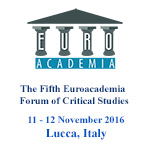Euroacademia Conferences
 Europe Inside-Out: Europe and Europeanness Exposed to Plural Observers (9th Edition) April 24 - 25, 2020
Europe Inside-Out: Europe and Europeanness Exposed to Plural Observers (9th Edition) April 24 - 25, 2020 Identities and Identifications: Politicized Uses of Collective Identities (9th Edition) June 12 - 13, 2020
Identities and Identifications: Politicized Uses of Collective Identities (9th Edition) June 12 - 13, 2020 8th Forum of Critical Studies: Asking Big Questions Again January 24 - 25, 2020
8th Forum of Critical Studies: Asking Big Questions Again January 24 - 25, 2020 Re-Inventing Eastern Europe (7th Edition) December 13 - 14, 2019
Re-Inventing Eastern Europe (7th Edition) December 13 - 14, 2019 The European Union and the Politicization of Europe (8th Edition) October 25 - 26, 2019
The European Union and the Politicization of Europe (8th Edition) October 25 - 26, 2019 Identities and Identifications: Politicized Uses of Collective Identities (8th Edition) June 28 - 29, 2019
Identities and Identifications: Politicized Uses of Collective Identities (8th Edition) June 28 - 29, 2019 The European Union and the Politicization of Europe (7th Edition) January 25 - 26, 2019
The European Union and the Politicization of Europe (7th Edition) January 25 - 26, 2019 7th Forum of Critical Studies: Asking Big Questions Again November 23 - 24, 2018
7th Forum of Critical Studies: Asking Big Questions Again November 23 - 24, 2018 Europe Inside-Out: Europe and Europeanness Exposed to Plural Observers (8th Edition) September 28 - 30, 2018
Europe Inside-Out: Europe and Europeanness Exposed to Plural Observers (8th Edition) September 28 - 30, 2018 Identities and Identifications: Politicized Uses of Collective Identities (7th Edition) June 14 - 15, 2018
Identities and Identifications: Politicized Uses of Collective Identities (7th Edition) June 14 - 15, 2018
Art Production, Consumption and the Effects of Gentrification: Cultural Capital as Utility for Gentrification
-
-

-
Presentation speakers
- Ana Varas Ibarra, University of Essex, UK
- Download presentation
Abstract:
Some scholars have questioned whether contemporary art is neoliberalism in its most purified form. Whether we like it or not, contemporary art is thoroughly permeated with the processes of gentrification, capital accumulation, and the procedures of divestiture and exploitation. Artists already complicit in the renegotiation of urban meaning for elites, were called upon to enter into social management. Real-estate concessions have long been extended to artists and small non-profit organisations in the hope of improving the attractiveness of the “up-and-coming” neighbourhood. The prominence of art allows museums and artistic/architecture groups, to insert themselves into the conversation on civic trendiness and urban planning. Martha Rosler specifies that artists are hardly unaware of their positioning by urban elites . However, one should ask to what degree artists are aware and/or taking responsibility for the repercussions their actions might have in the global socio-political space and how the changes in this space intrinsically affected the artistic production. This paper aims to contextualise the emergence and development of socially engaged art through the urban phenomenon of gentrification. Gentrification creates a matrix of accumulation and consumption of cultural expression and social control that changes the nature of the city. Additionally, the rising value of art enhances the value of related factors: the urban forms that grow up around it, the activity of doing it, and the status of consuming it . To understand the implications this process has in the artistic arena, this paper will provide an exploration on how the restructuration of the urban space affects the production and consumption of art, and vice versa.
-
Related Presentations

Creative Industries in Norway: A Question of Cultural Heritage and Identity
- Ekaterina Bagreeva













